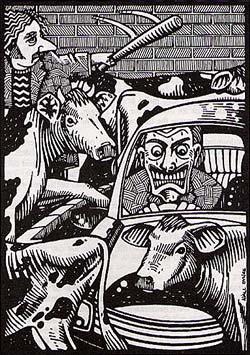|
Pat Smyth, a civil servant with the National Assistance Board in West Tyrone from the 1930's to the 1950's, recalls his memories, experiences and the larger than life personalities he encountered on the way.
There are one or two episodes of significance that I must write about. Firstly, there is my one and only close encounter with some aggressive characters of the ilk made famous by Carleton.
I was innocently endeavouring to traverse Ballygawley main street in an 'Austin Ten' saloon on a fair day and manoeuvring around loose cattle when I was forced to pull in at the kerb in the face of a massive herd of six-quarter bullocks being stampeded by a group of aggressive drovers armed with ash plants.
They drove the cattle between the car and the sidewall of a shop with such brutality that the one side was lifted off the ground, and one beast nearly came in through the windscreen. It ended up in a frenzied state with its forelegs astride the bonnet of the car, and its snout against the glass.
Fortunately, vintage cars were built like tanks and the Austin escaped with scratches. No one said a word. The cattle were hammered until they passed by. Later, when I rehearsed the episode to a policeman on duty he just shrugged his shoulders. 'There's a kind of war going on,' he said. 'The council want to take the fairs off the street. The drovers are determined to drive out the cars. You got caught in the middle'
My most enduring memory of a decade in Tyrone is a happy one. It is of a remote little white washed cabin, away near Glenhull - somewhere beyond the nine-pipe-bridge, in a town land with a name like Monanameal where the postman with his little red van was virtually the residents' only link with the outside world - Rafferty, I think was his name.
A little old lady wearing a spotless white apron and a checked cotton blouse lived there. She had had a frugal existence for years on nought but her ten-shilling pension, but her home was a palace. 'You could have licked meal off her floor' was how some of the locals would have put it. She had a goat, a few hens and a small garden.
Two leg-weary officials dropped in on a fine evening when the roadside hedges around Glenelly were ablaze with autumn colours. The old dear had already qualified for Supplementary Pension, which almost doubled her income and some documents had to be returned to her.
She was over the moon with delight and more than a little anxious to reward 'the man who had got her the money'. She asked him to 'accept something' which, of course, he declined. Then she pleaded with him to at least pull a few black currants, which the birds were eating, and take them home for his wife for jam.
Again, he declined, but to soften the blow, explained that hers was the last call and that he was hurrying back to Omagh for his tea.
She redoubled her pleas and 'at the rear of the hunt', Herbie Williamson accepted the proffered milk can and we headed for the currant bushes, so as not to hurt the dear lady's feelings.
We didn't linger, for we were indeed ravenous, but we could hardly believe our eyes when we re-entered the wee house. The table had been set with a snowy-white cloth. Two eggs had been boiled and a pot of tea and some home-baked bread awaited us.
What could we do but eat what was put before us all the while protesting that there were strict rules about accepting anything from anyone in the course of duty. Motherly, Mrs. Mullan just responded with a sweet little smile. 'Ach, don't bother me, sons, sure a mouthful of tea never did anyone a bit of harm'.
When the food was eaten with relish, it made the day for a kind little Irish mother whose family had all emigrated.
At Omagh a calendar inscribed with the words of a poem by Richard Williams alias 'Richard Rowley' came my way in the nineteen forties. It was wartime and the verses were heartening.
For a decade the calendar adorned the wall of my private office at Dublin Road, and when I vacated it I brought it with me. Now, at the fiftieth anniversary of the end of the war, and with peace restored in Northern Ireland after twenty-five years of bitter strife, Rowley's words still have not lost their appeal.
So long deferred the hope of winter's end.
The lips however fain lack heart to sing,
Ah! Midst these warring winds that rave and rend,
Who will dare dream of spring?
Oh, foolish heart! Oh, Doubting heart that quailed
Beneath the blackness of o'er shadowed skies,
Take courage now, for spring hath never failed
And beauty never dies.

'Fair day at Ballygawley'
Pat Smyth, 2001
| |


